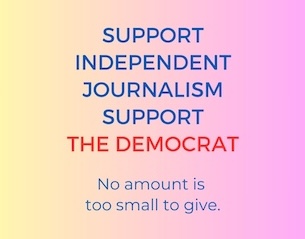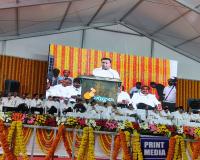- More
- Precise Communication is our ability to listen
Precise Communication is our ability to listen
By Rituparna Mukhopadhyay Kolkata : Augustine Veliath, Chairperson of the Nonviolence Project Foundation (India) shared his perspective on’ listening’ as the core for ideal communication at the MediaNext 2020 conclave on the 8th day of the online webinar on ‘Development & Political Communication Online’ #MediaNext 2020 is being organized by the Kolkata based Adamas University

By Rituparna Mukhopadhyay
Kolkata : Augustine Veliath, Chairperson of the Nonviolence Project Foundation (India) shared his perspective on’ listening’ as the core for ideal communication at the MediaNext 2020 conclave on the 8th day of the online webinar on ‘Development & Political Communication Online’
#MediaNext 2020 is being organized by the Kolkata based Adamas University which is a series of webinars in association with Sarda University, Birla Global University, DME, AIMEC, Lok Sansthan, exchange4media, ABP Education and IndiaReal. The mega conclave is being organized over 10 days from June 1, 2020, to June 10, 2020. Each day of the conclave focuses on one specialized domain of the Media & Entertainment (M&E) industry and the impact of the COVID-19 pandemic on the specific domain.
Nehru and Shankar
Veliath shared a case study of Jawaharlal Nehru and his political cartoonist friend Shankar who created 1500 cartoons on Nehru and those were satire, humour, and sarcastic but to-the-point. Nehru took the cartoons as the finest way of listening to fathom the real voice of the people. Then he critically gave an overview that how the present political scenario lacked the practice of listening in the Indian fabric of democracy.
Augustine Veliath is a media professional for over 40 years as an experienced communication strategist, imaginative writer, publisher, and mentor. Now he is the co-founder & director of the Asian Center for Entertainment Education. He is also the chief of the Nonviolence project foundation (India). Till recently he was Communications Specialist at UNICEF. He has also served as a media advisor to the ministry of woman and child development, Government of India. Apart from that, he is a passionate advocate on child rights & leaded many UNICEF movements including child survival revolution, global movements for children, universal immunization programs, etc. With a great track record in mobilizing and working with young people, he has worked in the most challenging states of India including UP, Bihar, MP, Chhattisgarh, and Rajasthan for long spells. In the year 2002, he got ‘Karuna Maitry’ award from the Dalit organization named ‘Buddha Mission’ for his unrivaled contribution to the life of oppressed children of Dalits in Bihar.
Development Communication Campaigns
Veliath shared his experience and lesson from his polio communication campaign that ‘Don’t make anybody hostile.’ With his great skills of imagination, he explained “virus is a hardworking phenomenal, you cannot convince or manipulate the virus; It will come back to you and strike back and make you look very stupid. The virus wants you to Invest and hard work.” According to him “the biggest lesson we need to do is the housing for the poor.” He also spoke about public health and said “this is one big opportunity for us to go back to the public health and the public health should begin 250,000 Gram Sabhas and every gram sabha should have special public health competent.”
Restore process of listening
Veliath said, “We need to get down to the people and listen to them. Don’t give them plans and promises, tell people how much and when will you give?”
Health Communication
Veliath said, “The biggest lesson of Corona virus was “invest in health.” He then drew example of Shailaja Teacher, the health minister of Kerala how she dealt with the Corona crisis and tackled the issue with proper communication. Finally said, “I don’t know why we called Migrant Workers, I travelled throughout the country no one addressed me like that…in Kerala they called them Guest Workers.”
Exclusive Interview
In the interview session with the writer of this article, Velieth answered a few questions related to his work and experience. He defined three kinds of violence as situation violence, domestic violence, and racial and caste violence. He also talked about some upcoming changes in creating the educational programme by the Nonviolence Project Foundation (India) on the post COVID situation. Veliath said, ” The kind of work I do is to make the child as a self-confident person and we teach them conflict management. That’s the campaign we are doing for the last 30 years and so we would try to reach out to the schools but now in this coronavirus situation, we will mostly go online so that we can train lots of teachers online. That’s the basic alteration will be happening by the other hand we are now in a procession to create a massive online community, we are also trying to promote ‘spirituality above all religion’.”
On being asked about his work in the challenging Indian states UP and Bihar he said “ In UP and Bihar I was working as a UNICEF communication officer and my work was mostly with children’s and their rights. So I had created some 14 different kinds of platforms where children can participate such as child reporters, child parliamentarians, and children’s rights congress; and some of the neighboring states adopted that.” He added, ” there are many kinds of challenges, one big challenge is that we take children for granted and we don’t listen to children but they have great ideas and great things to tell another problem is we also not investing on children so we create that platform where children can speak.”
Lastly, he made suggestions for the media students to develop their personality and skills in the post COVID world by saying “ In media, lots of people sold themselves out. They create that kind of news that ministers want to here, which is very dangerous. So instead of getting journalism, we are getting a choir. Our entire hope is in the honest media which criticizes the government but the moment you surrender it then tour journalism is not worth it. So it’s my suggestion to all of the media students – you have to expose them, investigating and telling the truth to the people who can make a difference.”
ooo











